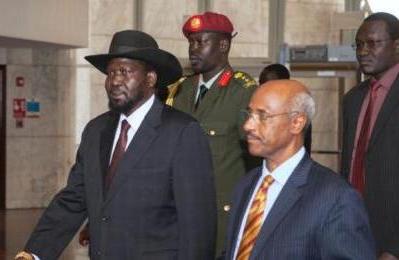S. Sudan peace talks hit deadlock as mediators decide on next move
By Tesfa-Alem Tekle
March 4, 2015 (ADDIS ABABA) – The last round of the peace talks in the Ethiopian capital, Addis Ababa, between the two warring parties in South Sudan has come to a standstill as president Salva Kiir and his rival former vice-president, Riek Machar failed to agree on any of the major outstanding issues.

However, in the last three days of their direct face-to-face negotiations, Kiir and Machar failed to agree.
A rebel’s spokesman blamed the government for what he said was unnecessary intransigence on all major issues.
“President Salva Kiir is not ready for peace. He flagrantly rejected without explanation all major issues that are fundamental to achieving a lasting peace in the country,” Machar’s spokesman, James Gatdet Dak, told Sudan Tribune on Wednesday.
He explained that contentious major issues that the two leaders could not agree on by Wednesday include federalism, status of forces, transitional security arrangements, wealth-sharing, status of national legislature, national debts, transitional justice and parameters of the permanent constitution making process.
However, Dak further said that the two leaders will on Thursday, 5 March deadline, negotiate on other outstanding issues on governance which they did not discuss on Wednesday.
“The two principals will on Thursday discuss leadership structure, power sharing ratios and institutional reforms,” he said.
The rebel leader’s spokesman said in case of disagreements the two top leaders will submit their report to the IGAD mediators and it would be up to the mediators to decide on the next move.
“The situation would then be left to the IGAD mediation to suggest a way forward. Either to extend the deadline or impose a compromise position or call for any other action,” he said.
Dak however reiterated that the rebel group was committed to a lasting peace, but accused the government of not willing to make a meaningful peace agreement.
G-10 EXCLUDED FROM TALKS
Also the two factional leaders, president Salva Kiir and Riek Machar, leader of the opposition faction of the Sudan Peoples’ Liberation Movement (SPLM-IO), have in their face-to-face talks excluded from the latest process Pagan Amum, the representative of former detainees or G-10.
The move by the two rival leaders comes one day before expiry of IGAD set deadline for South Sudan peace deal, IGAD source told Sudan Tribune.
In the unexpected move and under the very watch of the regional mediators on Tuesday the two leaders agreed to distance the former detainees from participating in the final negotiations which are aimed to strike a comprehensive peace agreement for South Sudan.
The G-10, comprising former cabinet ministers were arrested in Juba after accused of involving in a coup plot allegedly staged by Machar in December 2013, an accusation they together with Machar dismissed as a ploy by Kiir to silence party leaders who were pushing for internal reforms.
Machar fought for their release from the detention and put it as a condition for further peace talks with the government. However, the G-10 group once freed decided not to join Machar in the armed struggle against president Kiir.
However, Machar in a new agreement with Kiir this week according to insider sources, didn’t only refuse the former detainees from participating at the talks but also intended to “betray” them on the power sharing deal as well.
The move would contravene the Arusha intra-SPLM agreement which calls for a proportional representation between the three SPLM factions during the interim period.
However, Machar’s spokesman Dak refuted the allegation, explaining that the move came as the factional negotiating committees finally referred all disagreements to the two principals for direct negotiations.
He said the G-10 participated in the initial negotiations and presented their position papers until the matter was now taken up by the two leaders, Kiir and Machar, to try to resolve the sticking points before the deadline.
“Nobody denied their power-sharing ratio in future transitional government of national unity,” he said.
Members of former detainees were not available later on Wednesday for comments.
UN SACTIONS LOOMING
The United Nations Security Council (UNSC) on Tuesday unanimously adopted a resolution which would allow to impose sanctions on the South Sudanese warring parties such as travel ban and asset freeze.
As the 5 March deadline set for the conclusion of the South Sudan negotiations approaches, UN Secretary-General Ban Ki Moon, has strongly urged the two principals to sign a peace agreement or respect the 23 January 2014 signed cessation of hostilities agreement in order to avoid actual imposition of the sanctions.
“President Salva Kiir and former vice president Riek Machar to show leadership, put the well being of South Sudanese ahead of all other interests, and make the necessary compromises to conclude a power sharing agreement that paves the way for a comprehensive settlement of the conflict in South Sudan,” the Wednesday statement partly reads.
He reminded both parties that “the best way to avoid the enactment of actual sanctions by the Security Council, is to strictly adhere to the Cessation of Hostilities agreement of 23 January 2014, fully comply with International Human Rights and Humanitarian Law, extend their full cooperation to United Nations and humanitarian personnel in the discharge of their mandates and duties, and conclude a Comprehensive Peace Agreement that places South Sudan back on the path to stability and prosperity,” it further reads.
The US drafted resolution however doesn’t name the two rival leaders as targets but indirectly states “leaders and entity.”
Although other UN diplomats oppose the sanctions, US Ambassador, Samantha power however favours the resolution.
“Those who frustrate peace must begin to pay the price,” said Power.
As Thursday is the deadline set by IGAD for signing of a final peace deal for South Sudan, it remains unclear the course of action the regional mediators will take to ensure lasting peace and end the 15-month long war.
(ST)
